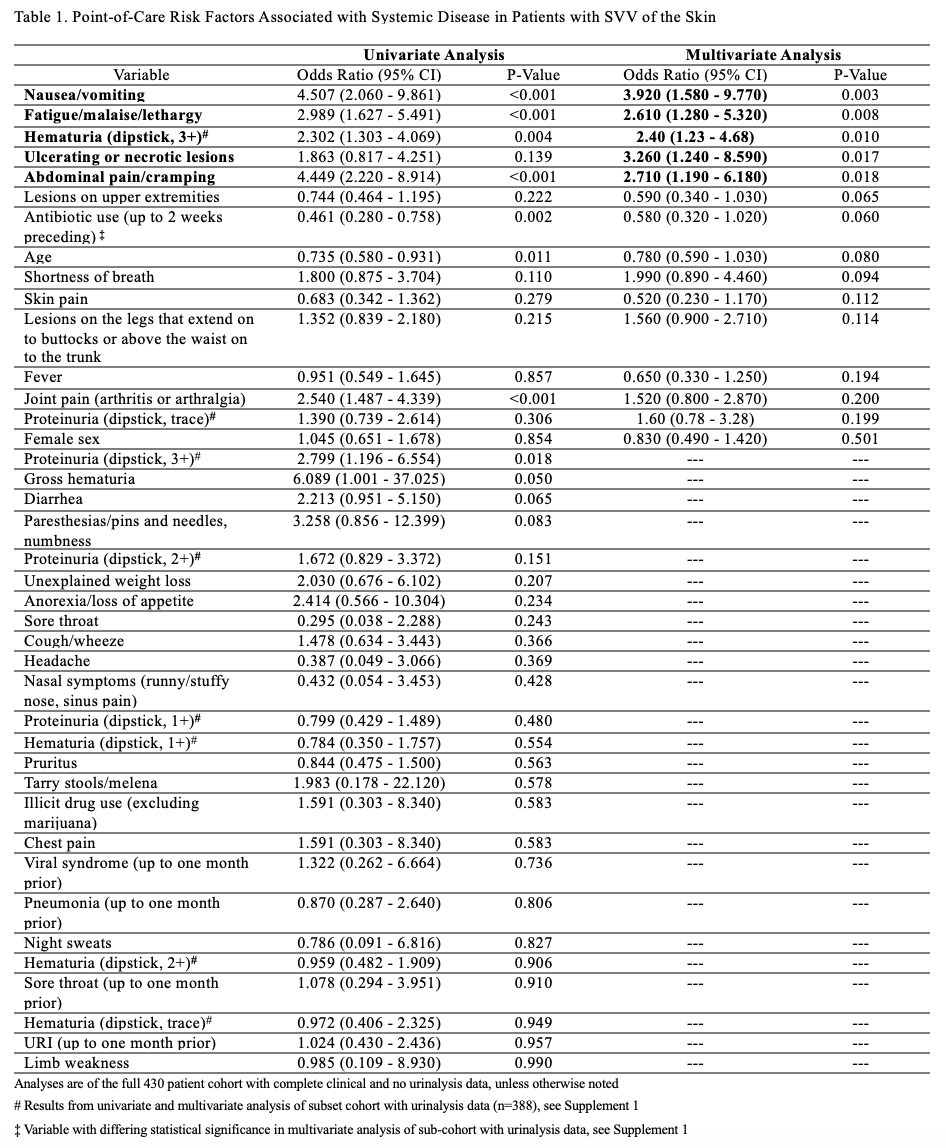Session Information
Date: Tuesday, October 28, 2025
Title: (2524–2546) Vasculitis – Non-ANCA-Associated & Related Disorders Poster III
Session Type: Poster Session C
Session Time: 10:30AM-12:30PM
Background/Purpose: Small vessel vasculitis (SVV) presenting in the skin may be skin-limited or a manifestation of systemic vasculitis or an underlying autoimmune disease. However, no evidence-based protocols exist to identify patients at risk for systemic involvement. This study aimed to identify clinical features present at the time of initial evaluation that predict systemic disease in patients with SVV of the skin, to support early risk stratification and management.
Methods: This multi-center case-control study included 430 adults with biopsy-confirmed SVV of the skin, identified from pathology databases at Massachusetts General Hospital, Brigham and Women’s Hospital, and the Hospital of the University of Pennsylvania. In accordance with Chapel Hill consensus criteria, cases were considered to have systemic disease if the SVV was associated with systemic vasculitis or connective tissue disease, or if the SVV caused objective organ dysfunction. Demographic, clinical, and laboratory features at initial presentation were assessed.1 Univariate and multivariate logistic regression analyses were performed to estimate odds ratios (ORs) and 95% confidence intervals (CIs), with variable selection guided by elastic net regression and 10-fold cross-validation. Significance was set at P < 0.05.
Results: Among 430 patients (mean [SD] age, 55 [17.7] years; 55.5% male), 87 had systemic disease and 343 had skin-limited SVV. Multivariate analysis identified nausea/vomiting (OR 3.92; 95% CI 1.58–9.77), ulcerating or necrotic skin lesions (OR 3.26; 95% CI 1.24–8.59), abdominal pain/cramping (OR 2.71; 95% CI 1.19–6.18), and fatigue/malaise/lethargy (OR 2.61; 95% CI 1.28–5.32) as significantly associated with systemic disease. In a subset with urinalysis data (n=388), dipstick hematuria (3+) was associated (OR 2.40; 95% CI 1.23–4.68) and recent antibiotic use was inversely associated (OR 0.54; 95% CI 0.29–0.98) with systemic disease. Joint pain (OR 2.54; 95% CI 1.49–4.34) and younger age (OR 0.74 per SD increase; 95% CI 0.58–0.93) were associated in univariate but not multivariate analysis.
Conclusion: In this multi-institutional study of biopsy-proven SVV, we identified constitutional and gastrointestinal symptoms, necrotic or ulcerating lesions, and dipstick hematuria (3+) as predictors of systemic involvement. These point-of-care features may aid in identifying high-risk patients requiring further evaluation and closer monitoring.
To cite this abstract in AMA style:
Mahajan A, Song W, Walls A, Mostaghimi A, Micheletti R, Piette E. Point-of-Care Risk Factors for Systemic Disease in Patients Presenting with Small Vessel Vasculitis of the Skin [abstract]. Arthritis Rheumatol. 2025; 77 (suppl 9). https://acrabstracts.org/abstract/point-of-care-risk-factors-for-systemic-disease-in-patients-presenting-with-small-vessel-vasculitis-of-the-skin/. Accessed .« Back to ACR Convergence 2025
ACR Meeting Abstracts - https://acrabstracts.org/abstract/point-of-care-risk-factors-for-systemic-disease-in-patients-presenting-with-small-vessel-vasculitis-of-the-skin/

